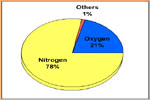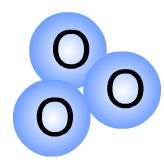Atmospheric Gases
Let’s take a moment to look at what makes up the "air" in the Earth’s
atmosphere. The air is really a mixture of many different gases, and each
gas has its own properties. The composition of air is not constant. It
can vary from time to time and place to place.
Major Composition
Below is a pie chart with a graphical representation of dry air.

Click on the image to find out what the atmosphere is made of.
Other Components (Variable)
The air in our atmosphere has some variable components to it as well.
These variable components include water vapor, dust particles, and ozone.
Although these are found in small amounts, they can have significant effects
on weather and climate.
Water Vapor
The amount of water is the atmosphere varies between 1 and 4%. Why is
such a small amount such a big deal? Water vapor is the source of all
clouds and precipitation, and often that is the most common reason people
think of for water. But water does other things too. It has the ability,
like carbon dioxide, to absorb heat energy given off by the Earth. It
can also absorb solar energy. When water changes from one state to another
it absorbs or releases heat. This heat is often called latent (hidden)
heat. This is the energy source that helps drive a lot of storms.

Dust
Dust is much more than just little specks of dirt. It includes microscopic
particles that are invisible to the naked eye, including pollen, spores,
and seeds. Dust particles are more commonly found in the troposphere,
near the Earth’s surface where their main source, the Earth itself. However,
there is dust in the upper atmosphere as well because some dust is carried
to great heights by rising currents of air. Other dust particles can be
remains of meteors that disintegrate as the pass through the Earth’s atmosphere.

So why is dust a big deal? They act as surfaces where water can condense
(group together), forming clouds from which water droplets can grow large
and fall to the ground as snow or rain. Without dust, you could not have
clouds or fog. Dust can also absorb or reflect incoming solar radiation.
When dust in the atmosphere is high, such as it would be after a volcanic
explosion, the amount of sunlight reaching the Earth’s surface will decrease.
Dust can also contribute to scattering light, giving rise to more orange
and red sunrises or sunsets.
Ozone
Ozone is a form of oxygen that combines three oxygen atoms into one molecule
(O3). There is very little of this gas in the atmosphere, and
it is concentrated in the stratosphere. Ozone absorbs ultraviolet (UV)
radiation, and without it the Earth would be uninhabitable.
Want to see how ozone works? Click on the ozone molecule to find out!
Or click the "next" button.

On to the Ozone
|